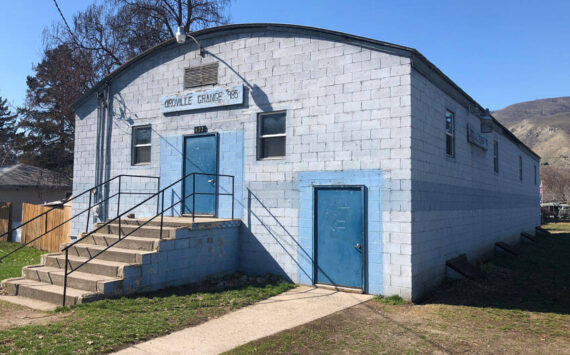Clarification desired about rights, planning
TONASKET – The devastating wildfires that scorched much of the southern half of Okanogan County this summer highlighted the need for managing emergencies that are larger than what local resources can handle.
The Tonasket City Council recognizes this, but was unwilling to sign off on Okanogan County Emergency Management’s plan for Tonasket without first meeting with Scott Miller, the county’s Homeland Security Coordinator.
City Clerk Alice Attwood said she’d been told that Miller would be unable to attend a council meeting to discuss the plan, and waned the city to adopt the plan at its next meeting.
Though, as Mayor Patrick Plumb noted, there wasn’t exactly an option to “shop around,” council member Scott Olson expressed reservations about approving a plan without first sorting out all the implications.
“When I look over the plan, we give up a fair amount of our rights and responsibilities in an emergency,” Olson said. “I want (Miller) to hear from us that we want it to be pretty drastic when that happens, and that we want certain things to happen when that happens.”
“If it gets to the point where we have exceeded our resources,” Plumb said, “I don’t want anything getting in their way of coming in and protecting people first, and property second.”
Council member Jill Vugteveen, a U.S. Forest Service firefighter, said in her experience the system in place would not deprive the city of its rights.
“I think the approach Scott Miller would take, using the Incident Command System, doesn’t take rights away,” she said. “It works for the entity effected by disaster. They would come in and run the show, but the IC, the person in charge of the whole operation, still works for the city and asks what we want. It’s based on the resources they have and their abilities. You don’t relinquish anything.”
Plumb said that the speed by which Pateros was overcome by fire showed how quickly a disaster could expand beyond the city’s capacity to handle it on its own.
“When the fires came, the cities in danger were immediately beyond the resources to deal with things,” Plumb said. “(Emergency Management) immediately opened up getting ways of getting more resources there. It wasn’t like Pateros wasn’t functioning as a government. They didn’t want to have to be in charge of things outside their scope, like who was going to run the Red Cross shelter.”
Olson said he also wanted to be satisfied that there was a plan specific enough to Tonasket’s needs that the city could be confident that it was as prepared as possible for an emergency response.
“To me, Scott Miller is the person in the county should be ready to do these things,” Olson said. “Now that (the county has) done it and know more of what’s available … for us to turn our obligation over… I think we need to have him come in front of us.
“We expect something for this; we’re passing something on and we have pretty high values. I don’t think a meeting is too much to ask.”
Hospital garbage dumpsters
Council member Dennis Brown said he had had conversations with North Valley Hospital about finding a permanent home for the garbage dumpsters that are sitting roadside on Western Avenue, and previously had limited sidewalk access.
The location of the dumpsters has been an issue with the council for most of the time since the new hospital building was completed several years ago.
“I talked to (Kelly) Cariker about the dumpsters,” Brown said. “I recommended a spot to keep them and he said he would take them to his boss. So the garbage could be on their property instead of in the street.”
Vugteveen, who has approached the hospital in the past about the dumpsters, was skeptical.
“I thought we pushed this to (permit administrator) Christian Johnson because we have been dealing with this for a long time,” she said. “I will believe it when I see it… I really am disappointed in the hospital’s ability to plan ahead for the space they have and what they need.”
Plumb said that it had been broached that the hospital could pay an annual fee through a franchise agreement with the city for the ability to utilize their current location streetside.
The council unanimously rejected that possibility.
“They have to get them out of the street, one way or another,” Brown said. When they built the building they should have thought of the garbage, but they didn’t… the only option they really have is over by the laundry unless they want to lose parking.”
Flags on Whitcomb
The council had been asked by the American Legion to consider taking over maintenance of the American flags that line the street on special occasions, along with moving them further up the power poles and leaving them there permanently.
“I think we have talked at length about this,” Plumb said. “But we didn’t officially make a decision.”
“I’ve only gotten two comments about the flags,” Olson said. “They both were complaints that they were tattered and we got razzed about them… they only complain when they look bad.
“We have two nice flags: at the TVBRC, and the Kiwanis one that Hugh (Jensen) care of, and there is the one at the Junction.”
Vugteveen noted that keeping permanently-mounted flags in acceptable condition was an additional duty that the city had neither the time nor money to take on.
“I want to make a motion to support the way we currently celebrate the flags on special occasions, the way we do it now,” Olson said. “I think it’s a good way to do it, and it’s appropriate.”
That motion passed unanimously.
Playing chicken
Olson said he had been approached about codifying the allowance if chickens in some outlying parts of the city, specifically the newly-annexed portion of town near Seventh Street.
I abstain from this issue because this is an issue of my wife’s,” he said. “But I remind the council that… we agreed that after one year of annexation on Seventh Street we would give one year, as a rural residential area, that chickens would be allowed there. We’ve had no complaints.”
Olson said that at the council’s code review meeting several months ago, that if there were no complaints the city would update its code to allow chickens.
“I propose forming a committee … of the citizenry,” Olson said. “And ask those involved to provide a proposal, that the council could discuss.”
Plumb it would be a good issue to be brought forth on the city’s water bill notification, and council member Claire Jeffko volunteered to be part of the commitee.
Odds and ends
The airport club, along with Jim Rice, who lives on the airport property, requested that the city consider finding a way to provide more water to the airport, primarily for fire prevention and firefighting purposes. Currently, Rice said, three sprinklers running for a short time is enough to exhaust the water supply. A second well was drilled some time ago but never had a pump installed. The council asked for cost estimates to be produced for consideration at any future discussion.
Gary Reams, a candidate for Okanogan County Coroner, gave a presentation regarding his candidacy and stayed for the full meeting.
Jensen reported that excavation for the Tonasket Water Ranch at Chief Tonasket Park began the previous day and said that regardless of any new issues that arose during construction, “This is going to work.”
The Tonasket City Council next meets on Tuesday, Sept. 23, at 7:00 p.m.



